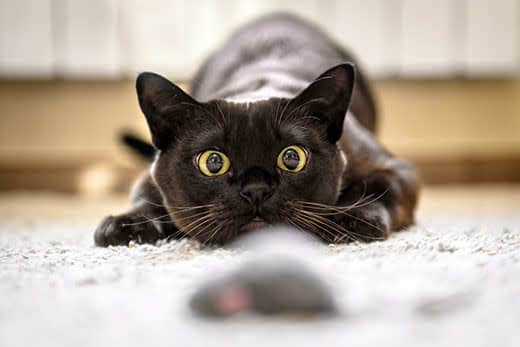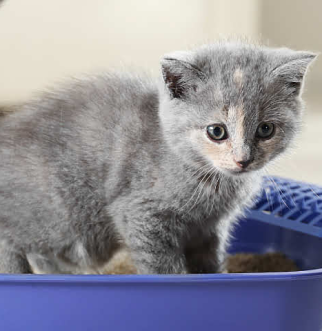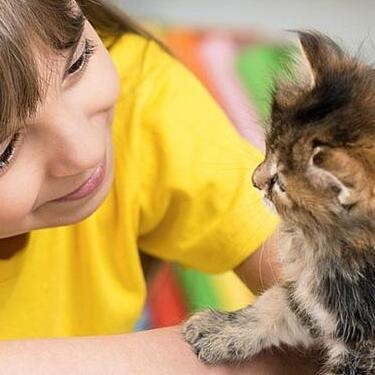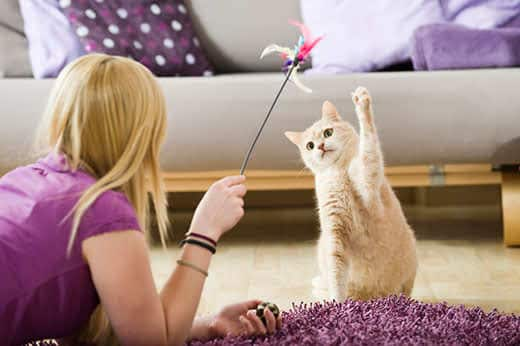
-
Find the right food for your pet
Take this quiz to see which food may be the best for your furry friend.
Find the right food for your pet
Take this quiz to see which food may be the best for your furry friend.
Featured products
 Adult Healthy Cuisine Roasted Chicken, Carrots & Spinach Stew Dog Food
Adult Healthy Cuisine Roasted Chicken, Carrots & Spinach Stew Dog FoodDelicious roasted chicken paired with tender vegetables in a succulent stew
Shop Now Adult 7+ Perfect Digestion Chicken, Whole Oats & Brown Rice Recipe Dog Food
Adult 7+ Perfect Digestion Chicken, Whole Oats & Brown Rice Recipe Dog FoodScience Diet's breakthrough nutrition supports ultimate digestive well-being & healthy microbiome for dogs age 7+
Shop Now Small & Mini Savory Stew with Chicken & Vegetables Dog Food
Small & Mini Savory Stew with Chicken & Vegetables Dog FoodA delicious complement to the nutrition of Science Diet Small & Mini 7+ dog food
Shop NowFeatured products
 Adult Savory Entrée Can Variety Pack Cat Food
Adult Savory Entrée Can Variety Pack Cat FoodPrecisely balanced nutrition with the delicious taste of savory minced chicken to help fuel the energy needs of cats during the prime of their life
Shop Now Adult 7+ Senior Vitality Chicken & Vegetable Stew Cat Food
Adult 7+ Senior Vitality Chicken & Vegetable Stew Cat FoodImproves Everyday Ability to Get Up & Go
Shop Now Adult 7+ Tender Tuna Dinner Cat Food
Adult 7+ Tender Tuna Dinner Cat FoodWith delicious chunks in a decadent gravy
Shop Now -
Dog
- Dog Tips & Articles
-
Health Category
- Weight
- Food & Environmental Sensitivities
- Urinary
- Digestive
- Joint
- Kidney
-
Life Stage
- Puppy Nutrition
- Adult Nutrition
- Senior Nutrition
Cat
- Cat Tips & Articles
-
Health Category
- Weight
- Skin & Food Sensitivities
- Urinary
- Digestive
- Kidney
-
Life Stage
- Kitten Nutrition
- Adult Nutrition
Featured articles
 Why Are Dogs and Cats So Cute?
Why Are Dogs and Cats So Cute?If waggy puppy dog tails and furry kitten yawns make you swoon, you're not alone. Why are cats so cute? And, dogs too! Let's find out!
Read More Does My Pet Hate Me?
Does My Pet Hate Me?Learn tips for bonding with your pet if you've ever thought, 'My dog doesn't like me, or 'Why do I have a standoffish cat?'
Read More Do Dogs and Cats have Belly Buttons?
Do Dogs and Cats have Belly Buttons?Learn whether cats & dogs have belly buttons like humans, what the function is, and if there are any health concerns associated with it.
Read More -


As a cat lover, you've seen play aggression in cats, and you have the scratches to prove it. You may sometimes wonder: Is my cat too aggressive?
Cat play looks like aggression. After all, cats use teeth and claws to subdue toys and playmates — and your ankles. Sometimes innocent roughhousing crosses the line into aggression. Fun and games for them can turn dangerous, even when your cat means no harm. Learn how to identify different types of aggression in cats and how to keep their sharp parts from causing injury.
How Cats Play
Kittens play to learn how to interact with their world, other cats and people. They also play to practice skills needed in adulthood, such as hunting. Activity keeps cats of all ages fit, and play relieves stress and burns energy.
Kittens play at 4 weeks old. Techniques include object manipulation and social games with other cats and humans. Here are some common ways that cats play
- Stalking: Cats lurk in hiding spots and crouch close to the ground, ready to leap out and ambush. They often tread with their back paws to "rev up" for the leap attack.
- Pouncing: Cats leap forward to capture an object (or your toes) with their front paws. They may fall on one side, grasping with their front paws while "bunny kicking" their rear paws to subdue the toy.
- Swatting and scooping: A hole prompts paw exploration to fish out hidden treasure. Cats also indulge in paw-patting gravity experiments to knock objects off tables.
- Tip-toe shuffle: Their fur is fluffed and their tail curled downward, exaggerating fearful or aggressive behavior. They slick back their ears, arch their back and use a sideways approach to people, pets or toys.
- Play fighting: Cats chase, wrestle and bite with inhibited claws and teeth.
Social play peaks at about 3 months of age. Cats aged 4 to 9 months focus more on hunting games. Adult cats continue to play but often with less intensity.

Is My Cat Aggressive?
While dogs vocalize during play, cats stay silent. Even silent kitten play gets too rough when babies haven't learned how to pull their punches. So, is my cat aggressive? With older cats, when silent cat play turns noisy, you won't have to ask.
According to the ASPCA, "Aggression is threatening or harmful behavior directed toward a person, another cat or other animals." You may see one or a combination of the following:
- Swatting or striking
- Sideways-facing or flattened ears
- Stiff-legged posture
- Arched back
- Fluffed fur and tail
Aggressive vocalizations include:
- Spitting, like a feline gasp of surprise
- Hissing — often a fearful, defensive expression
- Growling or snarling, an offensive warning of an imminent attack
As you can see, the lines can be blurry between normal play and aggression. Pay attention to vocal cues to determine when play has crossed the line.


Tasty Tips
Other Kinds of Cat Aggression
Adult cat aggression happens for many reasons. You may wonder: Is my cat aggressive if they have good reason to lash out? Top reasons include fear and pain. Both are a cry for veterinary help. Cornell Feline Health Center says other kinds of cat aggression include:
- Territorial aggression: This kind is directed toward an animal or person invading a cat's space. Cats reach social maturity between 2 and 4 years old. They often get along until this age, when they begin to challenge each other for social position.
- Overcrowding of pets: Cats defend beds, food, kittens or other territory in the presence of other animals.
- Predatory aggression: This is directed toward animals or sounds — crying baby, violin — that remind cats of prey.
- Redirected aggression: They can't reach the critter out the window, so they take it out on you.
- Petting aggression: Unwanted handling prompts "leave me alone" bites. This can happen with excessive petting or when your cat is restrained, lifted or forced into unwelcome positions.
How to Handle Aggression
If you're still asking yourself, "Is my cat aggressive?" you can take steps to mitigate questionable behaviors. Adopting two kittens at a time is the best way to diffuse play aggression in cats. The kittens wrestle and target each other and learn biting and claw etiquette. A savvy adult cat also can teach adolescent cats proper limits.
When playing with your cat, avoid using your hands or feet as toys. Toss a cat toy or use fishing pole lures to redirect their energy out of biting range. Give cats a five-minute timeout in a room alone when play turns rough. Removing the source of their fun teaches them that they must play nice for games to continue.
Avoid physical corrections, as they can increase aggression. The MSPCA-Angell recommends trying noise deterrents, like shaking or tossing an empty soda can with a few pennies inside. This interrupts the behavior so you can redirect to more appropriate targets. Try a "hiss" to tell kittens to stop. It won't work for adults but may give babies pause. Here are some other quick tips:
- Avoid prolonged eye contact, which cats may perceive as threatening.
- Watch and listen for signals that warn of impending aggression. Stop the petting before cats tell you to. Stand up to dump kitty off your lap, or lure them off furniture, stairs or hallways with toys or treats so you can pass.
- When cats don't get along, use pheromone sprays and other calming products to ease the tension. Create a house of plenty. Provide lots of toys, food stations, cat trees and feline property to reduce arguments.
- Stop noisy play between pets, since cat complaints predict aggression. If cats continue fighting, separate them for at least 24 hours before reintroducing them.
Cats that draw blood, pull fur, terrorize other pets or scare you require professional intervention. Ask a veterinary behaviorist for expert help. Most cat aggression involves lots of noisy bluffing. Understanding and addressing the cause can prevent problems and get you and your cat back to living a harmonious life together.


Amy Shojai, is a certified animal behavior consultant, and nationally known authority on pet care and behavior. She began her career as a veterinary technician and is the award-winning author of more than 35 prescriptive nonfiction pet books.
Related products
Related articles

Cats are naturally very clean and chances are your kitten will already have learned how to use the litter box from her mother before she comes to live with you.

Discover how to train your cat, starting with very basic first steps that both reward good behavior and discourage the bad.

How do you get a cat to lose weight? Learn all about cat foods for weight loss, including how to choose weight control cat food and exercise tips.

What is the best food for an overweight cat? Learn all about weight control food for cats, including what's in it and how it works.

Put your cat on a diet without them knowing
Our low calorie formula helps you control your cat's weight. It's packed with high-quality protein for building lean muscles, and made with purposeful ingredients for a flavorful, nutritious meal. Clinically proven antioxidants, Vitamin C+E, help promote a healthy immune system.
Put your cat on a diet without them knowing
Our low calorie formula helps you control your cat's weight. It's packed with high-quality protein for building lean muscles, and made with purposeful ingredients for a flavorful, nutritious meal. Clinically proven antioxidants, Vitamin C+E, help promote a healthy immune system.


